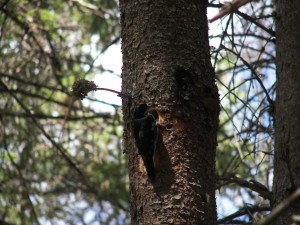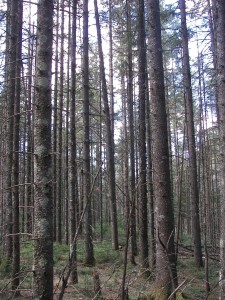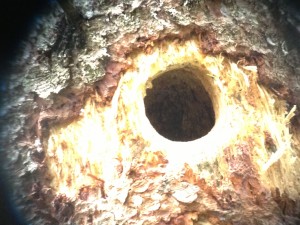
On July 18, 2013, I found an active Black-backed Woodpecker nest site in Minerva (western Essex Co., NY). The male and female were feeding the young inside the nest hole. This indicates the nest is six to seven weeks later than normal for our area.
I initially found this nest hole on May 4, 2013 when the male Black-backed Woodpecker was excavating the cavity. The hole is in a live, mature Tamarack tree approximately 25 feet off the ground. The male finished excavation of the nest hole, but I never found any subsequent evidence of nesting. I visited the location multiple times and spent several hours at the location on June 10, 2013, when I should have observed active feeding of young, as I was observing at other Black-backed Woodpecker nest sites in the Adirondacks. There was no activity near the nest hole that day, and I found a male Black-backed Woodpecker a good distance away. At the time, I wondered if something had happened to the female Black-backed Woodpecker. On other visits in May and early June, I observed the male Black-backed Woodpecker in the general area, but saw no sign of a female or any activity near the nest hole.
As I was hiking the trail in Minerva on July 18, 2013 around noon, a female Black-backed Woodpecker began to call non-stop and the male gave a rattle-call. As I observed the female calling, I also heard the chirring sound of Black-backed Woodpecker young coming from a nest hole. I was surprised to find that the nest hole was indeed used (after all that work on the part of the male in early May!). I made a huge circle around the nesting area so I would not be anywhere near the nest hole. I sat on the mossy ground and just observed the hole from a distance. The female continued to call for a few minutes, but never took the defensive position in the nest cavity. She flew off to forage after a couple minutes. As she came back with food, the male flew in and gave one rattle call as he went into the nest hole with food. After he left, she flew in to feed the young. Black-backed Woodpeckers feed the young inside the nest cavity during their first two weeks of life before the young are old enough to be fed at the hole. The young are typically 24 days old when they fledge. It is likely that the young at this nest will not fledge until the beginning of August! I typically see Black-backed Woodpeckers fledge just after the 3rd week of June. I have already observed family groups of Black-backed Woodpeckers moving around in other locations.
The Birds of North America account for Black-backed Woodpecker states that, “If eggs pilfered, female will lay a second set, often in same nest (Bent 1939).” This may indeed be the case for this nest site, but I never saw evidence of nesting after the male finished the excavation. I will never know exactly what happened earlier in the season. It was certainly quite a surprise to find such a late Black-backed Woodpecker nest today! I will continue to observe them over the next couple weeks.

- Male Black-backed Woodpecker excavating a nest hole in a live, mature Tamarack tree about 25 feet off the ground on May 4, 2013.

Any chance this is the same pair whose nest was raided earlier?
Hi Hillel,
This is a different location from the nest site where we observed a Red Squirrel predate nearly-fledged young on June 23, 2013.
As an update to this late nest – we visited the site on July 22, 2013 and there was no sign of adults or young. Obviously, something had happened to this pair’s first nest, and it seems like a long shot to reuse the same nest hole. There was no sign of the adult Black-backed Woodpeckers and no sound of young coming from the nest hole, but there was a Red Squirrel in this area. Sometime between July 18 and the 22nd, this nest was predated (probably for a second time).